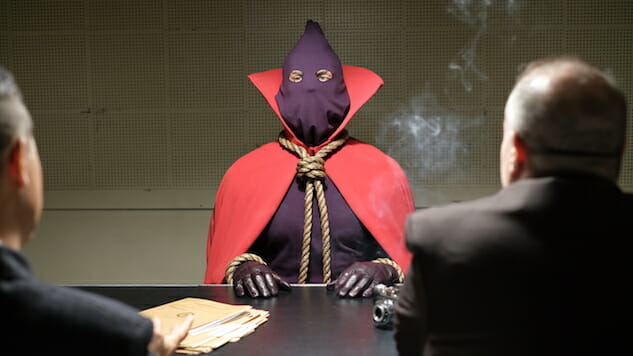How Watchmen Explores the Toxicity of Nostalgia and the Fallibility of Memory
Photo Courtesy of HBO
HBO’s Watchmen is comic book television on steroids. Not content to simply tell stories of costumed heroes who make friends, find love and save the world, this update of Alan Moore and Dave Gibbons’ iconic original 12-issue story wants to grapple with big, messy ideas and potentially unsolvable problems. This isn’t a story where a weekly adventure can be wrapped up in a neat bow, complete with a catch phrase. Instead, this is a superhero tale that tackles complex issues of race and racism in America, confronts the book’s problematic depiction of women head on, and provides additional—sometimes horrific, often mind-blowing—context for events from the original story.
It is, generally, the most ambitious superhero series that’s ever been on television.
Smarter and more capable writers than myself have tackled the way Watchmen has interrogated issues of race this season, particularly about the decision to make the comic series’ original vigilante, Hooded Justice, a black man. But in doing so, Watchmen leans even further into one of its most oft-repeated themes: The idea that memory is a living thing, something that we must grapple with each day to determine not just the veracity and worth of the stories we tell about ourselves, but how the things that have happened to us shape the people we become. These are the origin stories this Watchmen seems most interesting in telling. How does memory—of who we were, who we might have once become—shape the people we are, right now?
In the season’s sixth episode, “This Extraordinary Being,” Angela is nearly poisoned to death by taking a concentrated dose of her grandfather’s memories, in the form of pills that are literally called Nostalgia. Maybe this moment is just extremely on the nose, but it seems obvious that Watchmen wants to explore very specific ideas of memory—and its inherent dangers. Our memories inform who we are, and we must all come to terms with the things that have happened to us in different ways. But what happens when those memories paralyze us, or lock us into unhealthy ways of being? And what is nostalgia, if not weaponized memory, a way to collectively privilege some types of remembrance above others and to decide what versions of history ought to be declared true?
By challenging the accepted myth of Hooded Justice—a character originally presumed to be white in both Watchmen’s world and the pages of Moore’s original comic—the show explores the dangers inherent in communal memory that becomes de facto. Of course, the most foundational figure in the world of costumed adventuring had to be a handsome white guy with Cheyenne Jackson’s chiseled jaw, rather than an angry black man seeking the justice he and those like him had so long been denied. Collectively, America appears to have decided that’s the way things are and ought to be.
The idea that the first superhero was obviously a white man, the misconception that the 1950s are any sort of reflection of when America was “great”—these “histories” are dangerous, precisely because they so often sideline and exclude those who aren’t white, male, or otherwise in the center of mainstream society. If this realization makes us uncomfortable, it’s because it’s supposed to.
After all, the existence of Watchmen the show is almost entirely predicated on our memory of the comic that comes before it, both within the world of the series and outside of it. As we remember Moore’s original comic series, it’s easy to focus solely on the ways it was a truly groundbreaking superhero story and not how it essentially erased issues of race from its narrative—or frequently embraced misogynist and sexist tropes. The willingness of HBO’s series to critically confront and deconstruct the more problematic elements of its own legacy is both admirable and necessary.
-

-

-

-

-

-

-

-

-

-

-

-

-

-

-

-

-

-

-

-

-

-

-

-

-

-

-

-

-

-

-

-

-

-

-

-

-

-

-

-








































